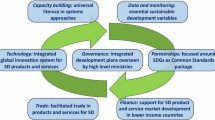Abstract
Mary Mellor explores the potential of money as an agent of socially just and ecologically sustainable development. Through an analysis of theories of money it shows how existing money systems work and how radical reform of the mechanisms of money issue and circulation could be achieved.
Similar content being viewed by others
References
Ahmed, Idris (2011) ‘The Road to Banking and Economic Stability’, Daily Trust, 29 August.
Bateman, Milford (2011) Why Doesn’t Microfinance Work? London: Zed Books.
Bellamy, Foster John (2009) The Ecological Revolution: Making peace with the planet, New York: Monthly Review Press.
Bennholdt-Thomsen, Veronika and Maria Mies (1999) The Subsistence Perspective, London: Zed Books.
Fernando, Jude (2006) Microfinance: Perils and prospects, London: Routledge.
Fuller, Duncan and Mary Mellor (2008) ‘Banking on the Poor: Advancing financial inclusion in Newcastle upon Tyne UK’, Urban Studies 45 (7): 1505–1524.
Galbraith, John Kenneth (1975) Money: Whence it came and where it went, London: Penguin.
Hanlon, Joseph, Armando Barrientos and David Hulme (2010) Just Give Money to the Poor: The development revolution from the global south, Sterling, VA: Kumarian Press.
Hutchinson, Frances, Mary Mellor and Wendy Olsen (2002) The Politics of Money, London: Pluto Press.
Ingham, Geoffrey (2004) The Nature of Money, Cambridge: Polity.
Keen, Steve (2009) ‘Debtwatch No 31 February’, www.debtdeflation.com/blogs, accessed 26 September 2011.
Keen, Steve (2011) Debunking Economics: The naked emperor of the social sciences, London: Pluto Press.
Keynes, John Maynard (1971) Collected Writings v. A Treatise on Money: The pure theory of money, Macmillan London: Royal Economic Society.
Knapp, Georg F. (1924) The State Theory of Money, London: Macmillan.
Mellor, Mary (2010a) The Future of Money, London: Pluto.
Mellor, Mary (2010b) ‘Could the Money System Be the Basis of a Sufficiency Economy?’ Real-World Economics Review 54: 79–88, http://www.paecon.net/PAERevuew/issue54/Mellor54.pdf, accessed 5 October 2010.
Nelson, Anitra and Frans Timmerman (eds.) (2011) Life without Money, London: Pluto Press.
Nersisyan, Yeva and L. Randall Wray (2010) ‘Deficit Hysteria Redux? Why we should stop worrying about US government deficits’, Real-World Economics Review (53): 109–128.
Nesvetailova, Anastasia (2007) Fragile Finance: Debt, speculation and crisis in an age of global credit, Basingstoke: Palgrave Macmillan.
North, Peter (2007) Money and Liberation, Minneapolis, MN: University of Minnesota Press.
Parguez, Alain and Mario Seccareccia (2000) ‘The Credit Theory of Money: The money circuit approach’, in John Smithin (ed.) What is Money? London: Routledge.
Rossi, Sergio (2007) Money and Payments in Theory and Practice, London: Routledge.
Roy, Anaya (2010) Poverty Capital: Microfinance and the making of development, London: Routledge.
Sardoni, Claudio (2010) ‘Money and its Future: A response to Mary Mellor’, Development 53 (3): 376–380.
Smithin, John (2009) Money, Enterprise and Income Distribution, London: Routledge.
The Economist (2011). Black holes: Fallout of the best Kabul Bank. 16 June 2011.
World Development Movement (2011) ‘Broken Markets: How financial regulation can help prevent another global food crisis’, Report, http://www.wdm.org.uk/sites/default/files/Broken-markets.pdf, accessed 3 October 2011.
Additional information
Explores the potential of money as an agent of socially just and ecologically sustainable development
Rights and permissions
About this article
Cite this article
Mellor, M. Money as a Public Resource for Development. Development 55, 45–53 (2012). https://doi.org/10.1057/dev.2011.107
Published:
Issue Date:
DOI: https://doi.org/10.1057/dev.2011.107




